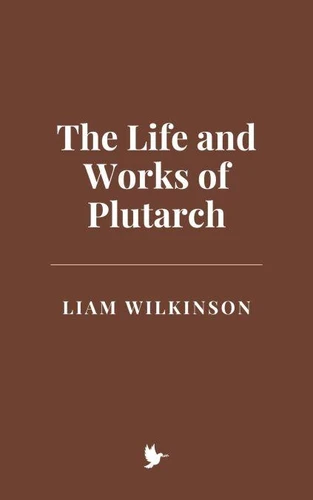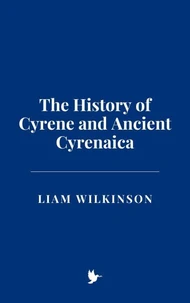The Life and Works of Plutarch
Par :Formats :
Disponible dans votre compte client Decitre ou Furet du Nord dès validation de votre commande. Le format ePub est :
- Compatible avec une lecture sur My Vivlio (smartphone, tablette, ordinateur)
- Compatible avec une lecture sur liseuses Vivlio
- Pour les liseuses autres que Vivlio, vous devez utiliser le logiciel Adobe Digital Edition. Non compatible avec la lecture sur les liseuses Kindle, Remarkable et Sony
 , qui est-ce ?
, qui est-ce ?Notre partenaire de plateforme de lecture numérique où vous retrouverez l'ensemble de vos ebooks gratuitement
Pour en savoir plus sur nos ebooks, consultez notre aide en ligne ici
- FormatePub
- ISBN8230959793
- EAN9798230959793
- Date de parution05/02/2025
- Protection num.pas de protection
- Infos supplémentairesepub
- ÉditeurIndependently Published
Résumé
This book explores the life, works, and enduring influence of Plutarch, a Greek philosopher, biographer, and historian, whose writings have shaped Western thought for centuries. Born in the 1st century AD during the height of the Roman Empire, Plutarch straddled the worlds of ancient Greek and Roman civilization. His most renowned works, Parallel Lives and Moralia, are not only historical accounts but also philosophical explorations of virtue, character, and leadership.
Through his unique approach to biography, Plutarch compared the lives of prominent Greek and Roman figures, using their stories as moral exemplars to instruct readers on the nature of virtue, power, and the responsibilities of leadership. This book delves into the historical, philosophical, and cultural contexts that shaped Plutarch's writings, analyzing the profound relationship between his ethical philosophy and his views on governance.
It examines his focus on virtue as a central component of leadership, his deep reflections on the decline of the Roman Republic, and his critiques of both Greek and Roman moral failures. Furthermore, it highlights the ways in which Plutarch's ideas influenced key thinkers throughout history-from the Renaissance humanists to Enlightenment philosophers-by providing a bridge between classical antiquity and modern thought.
The legacy of Plutarch's works is traced through their impact on political theory, literature, biography, and ethics. His moral reflections on the lives of historical figures, especially his emphasis on the interplay between individual character and historical events, continue to resonate in contemporary debates about leadership, moral responsibility, and the pursuit of virtue. Ultimately, this book underscores the timeless relevance of Plutarch's writings in understanding human nature and the moral dimensions of power, offering valuable lessons for modern leaders, thinkers, and readers seeking guidance on ethics, governance, and personal development.
Through his unique approach to biography, Plutarch compared the lives of prominent Greek and Roman figures, using their stories as moral exemplars to instruct readers on the nature of virtue, power, and the responsibilities of leadership. This book delves into the historical, philosophical, and cultural contexts that shaped Plutarch's writings, analyzing the profound relationship between his ethical philosophy and his views on governance.
It examines his focus on virtue as a central component of leadership, his deep reflections on the decline of the Roman Republic, and his critiques of both Greek and Roman moral failures. Furthermore, it highlights the ways in which Plutarch's ideas influenced key thinkers throughout history-from the Renaissance humanists to Enlightenment philosophers-by providing a bridge between classical antiquity and modern thought.
The legacy of Plutarch's works is traced through their impact on political theory, literature, biography, and ethics. His moral reflections on the lives of historical figures, especially his emphasis on the interplay between individual character and historical events, continue to resonate in contemporary debates about leadership, moral responsibility, and the pursuit of virtue. Ultimately, this book underscores the timeless relevance of Plutarch's writings in understanding human nature and the moral dimensions of power, offering valuable lessons for modern leaders, thinkers, and readers seeking guidance on ethics, governance, and personal development.
This book explores the life, works, and enduring influence of Plutarch, a Greek philosopher, biographer, and historian, whose writings have shaped Western thought for centuries. Born in the 1st century AD during the height of the Roman Empire, Plutarch straddled the worlds of ancient Greek and Roman civilization. His most renowned works, Parallel Lives and Moralia, are not only historical accounts but also philosophical explorations of virtue, character, and leadership.
Through his unique approach to biography, Plutarch compared the lives of prominent Greek and Roman figures, using their stories as moral exemplars to instruct readers on the nature of virtue, power, and the responsibilities of leadership. This book delves into the historical, philosophical, and cultural contexts that shaped Plutarch's writings, analyzing the profound relationship between his ethical philosophy and his views on governance.
It examines his focus on virtue as a central component of leadership, his deep reflections on the decline of the Roman Republic, and his critiques of both Greek and Roman moral failures. Furthermore, it highlights the ways in which Plutarch's ideas influenced key thinkers throughout history-from the Renaissance humanists to Enlightenment philosophers-by providing a bridge between classical antiquity and modern thought.
The legacy of Plutarch's works is traced through their impact on political theory, literature, biography, and ethics. His moral reflections on the lives of historical figures, especially his emphasis on the interplay between individual character and historical events, continue to resonate in contemporary debates about leadership, moral responsibility, and the pursuit of virtue. Ultimately, this book underscores the timeless relevance of Plutarch's writings in understanding human nature and the moral dimensions of power, offering valuable lessons for modern leaders, thinkers, and readers seeking guidance on ethics, governance, and personal development.
Through his unique approach to biography, Plutarch compared the lives of prominent Greek and Roman figures, using their stories as moral exemplars to instruct readers on the nature of virtue, power, and the responsibilities of leadership. This book delves into the historical, philosophical, and cultural contexts that shaped Plutarch's writings, analyzing the profound relationship between his ethical philosophy and his views on governance.
It examines his focus on virtue as a central component of leadership, his deep reflections on the decline of the Roman Republic, and his critiques of both Greek and Roman moral failures. Furthermore, it highlights the ways in which Plutarch's ideas influenced key thinkers throughout history-from the Renaissance humanists to Enlightenment philosophers-by providing a bridge between classical antiquity and modern thought.
The legacy of Plutarch's works is traced through their impact on political theory, literature, biography, and ethics. His moral reflections on the lives of historical figures, especially his emphasis on the interplay between individual character and historical events, continue to resonate in contemporary debates about leadership, moral responsibility, and the pursuit of virtue. Ultimately, this book underscores the timeless relevance of Plutarch's writings in understanding human nature and the moral dimensions of power, offering valuable lessons for modern leaders, thinkers, and readers seeking guidance on ethics, governance, and personal development.






















